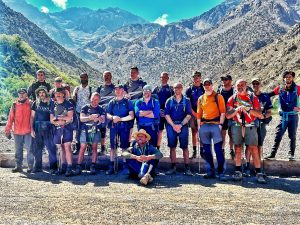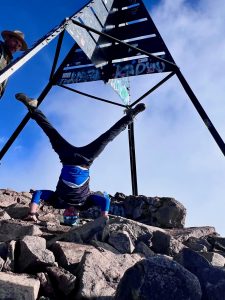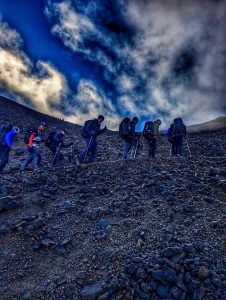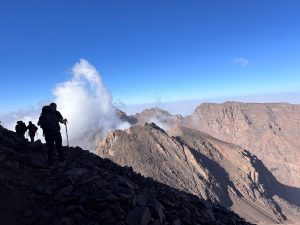2023 was supposed to be the year our mountaineering Exped to the Moroccan High Atlas Mountains came to fruition, however fate as always was yet to play its hand and a week from deployment Morocco was hit with a terrible earthquake causing the sad loss of thousands of lives. It was therefore decided to shift the whole Exped “to the right” one year. As the Exped leader this was my first (but certainly not the last) very real challenge, but it was certainly the right thing to do in such tragic circumstances.
A year on and (maybe), a bit wiser, 14 Army Reserve unit soldiers formed up on a cold rainy morning in Exeter, ready to jet of to hopefully sunnier and higher climbs. For once the staff at Gatwick airport were in work and all checked in we flew to Marrakesh airport arriving in a balmy evening in Morocco.
Why were we there?
The aims of AT are well known to most, resilience, experience, exposure to controlled risk, leadership, all of which are important and certainly featured in our Exped. For many this would be a first exposure to high altitude mountaineering and for most the longest number of consecutive trekking days. We had prepared well and had an excellent team, we were forced to make a couple of changes due to availability, however, the spine of the team had been fixed for well over a year.
What was the aim?
The main aim was to conduct 11 days trekking in the High Atlas region, culminating in an attempt to climb Mount Toubkal, which at over 4100 meters is the highest mountain in North Africa (picture 3 Ben Nevis’s stacked on top of each other).
The Team
The team was certainly a good mix of both experience, age, rank, and ability, this was deliberately chosen to be so as to reflect the wide dynamic nature of the Army Reserves. As Exped leader I was ably assisted by my ever-patient 2IC Gez Armstrong, with Ben Law as lead mountain expert and Steve Barnes as Exped medic. We were also very fortunate to have Carl Rawes as a guest mountain leader, a veteran of many such Expeds, Carl’s experience, calm manner and humour were invaluable to all.
First impressions
As Exped leader I had been informed that there was a standing agreement with the Moroccan Armed Forces (MAF), who may attend and follow us as we conducted our Exped, I was also told that they never show up! To my amazement not only did we have 10 MAF soldiers but also 5 members of the Moroccan Royal Police, who would escort and ensure our safety throughout. This meant that on arrival in Marrakesh we were give the full VIP Blue light escort to our hotel and onwards the next day into the mountains, for some on the trip this was a highlight in itself! The MAF forces and Police conducted themselves brilliantly through the whole trip, they very much added to our Exped, which would not have been the same without them. Their local knowledge in particular was an excellent advantage, one of which we tried very hard to maximise at all times.
First steps
Our “step off” point was in a place called Imlil, which is widely regarded as the gateway to the Toubkal National Park, on the Sunday (22 Sept), we were delivered (via blue light escort), to our staging location in Imlil. That night we stayed in a mountain B & B known as a Riad, this Riad being owned by the trekking company that we were using called Atlas Vertical. Atlas Vertical were contracted to deal with all of our daily needs including:
- Meals and drinks (lots of water required).
- Accommodation (either tents or Riads).
- Mountain guides (we had two, Muhammad and Hassan), both of whom were exceptional mountain guides.
- Mules and muleteers (to carry the bulk of our kit).
- Chefs and porters.
On that Sunday we went for our first trek as a wider team, this was to “shake out”, any issues but also for our guides to asses our group. I am happy to say we passed muster and were classed as a “strong team”, I bet they say that to everyone. We then had an evening to do any final preparations before an early start the next day.
Daily routine
After a couple of days, we soon fell into a good daily routine, this was only possible due to the efforts of our support team from Atlas Vertical. A typical trekking day would look like this:
- 0700- Everyone to be showered (where available) and dressed ready for morning brief.
- 0800- Brief on the day’s activity and dynamic risk assessment by safety team.
- 0800 onwards- Breakfast. This consisted of porridge, bread, fruit, spreads, (including a delicious honey and peanut butter mix),and lots and lots of the local staple, Moroccan Mint tea.
- 0900 – activity begins (on longer days these timings were bought forward so we could trek in the cooler morning periods for longer).
- 1300- Lunch, this could be a packed meal or on many occasions a fully cooked meal of thins like Tagine (a cooking pot somewhat like a slow cooker), couscous and lots of bread and tea. It must be said at this point, having opted for the GOLD food package, we were never even remotely hungry, the food whilst basic was tasty and nutritious and was ideal for the activity in hand).
- 1730- Snack time, this was a great morale boost, we would be served things like fresh popcorn, biscuits, or local snacks.
- 1930- Evening meal, this was a highlight for all after hard days of trekking, most of us were tracking at least 3500 calories burned each day (many if not all are somewhat slimmer post Exped). The chefs would produce an abundance of hot high Carb/calorie food and it was amazing to me (as a hobby chef), what they could produce with so little time and resources.
- 2130- at the end of each day Ben and Carl would assess the next day’s trekking activity, I would speak to the trekking firm and our logistics lead Mark Dallyn would co-ordinate the plethora of administration tasks that required close attention, Mark did an excellent job throughout and is to be commended for their efforts. Our medic would run a “sick bay” dealing with very minor ailments like blisters or “travellers’ tummy”, Steve’s dry sense of humour and genuine good will ensured that we all stayed in one piece for the duration.
Summit time
Having trekked for 8 days (with a day’s administration break) and been to a maximum height of 3017 meters, we were now ready to take on the Toubkal challenge, the first stage of which was to hike up to the Toubkal Refuge which sits just over 1000 meters below the summit of Mount Toubkal. The refuge itself is a large imposing building and is extremely busy, with a near constant flow of trekking teams heading up and down the mountain (at all hours of the day). We are now sleeping at above 3000 meters which for many was a strange experience, sleeping is a little more difficult and any movement really gets the heart going.
0400 hours on Tuesday 01 October, we set off, head torches on and joined a torchlight procession to the top. The route started with some very difficult bolder terrain and midway turned to a series of “switchbacks”, slowly but surely zig zagging its way to the summit. We started quite early to pass people who had already summited, most indicated that it was very cold and cloudy “up top”, and our hopes of a view were diminishing rapidly. That said when we did finally summit we were in luck! We had picked probably the only 30 minutes that day where there was not only a clear view but also a quite summit (sometimes you have to wait in line to get a summit picture).
As well as the usual team photographs we were also able to promote one of our team from Corporal to Sergeant (Sergeant Joanne Page), and this was a very popular highlight of our day on the “big mountain”.
Post about a million photo’s, we managed to extract ourselves safely from the summit and return to the base camp. Those with experience will attest to the fact that most injuries/illnesses/ accidents happen on the way down, so as Exped lead I was immensely relieved when we all returned safely.
We decided to stay at base camp for the remainder of that day and night, this was to rest and prepare for the trek back down to our summit start point in the village of Armend.
The next day saw us doing a lot of administration and preparation for a meal that evening, organised by Atlas Vertical this meal brought all teams and staff together and was followed by some speeches and award giving. Most would agree it was the best meal of the trip to date and could be taken at leisure as all of the hard miles had been done.
Marrakesh
Our last 36 hours was spent in Marrakesh, we took the time to visit the ancient markets and monuments but also to unwind and appreciate the culture, cuisine, and friendly atmosphere of this ancient city. Like many areas in the High Atlas, Marrakesh is still showing the scars of the earthquake last year, many buildings remain ruined, and it is testament to the fortitude and dedication of the people that so much has already been done to make good the destruction. We flew back on Saturday 5th October, tired but extremely grateful for the opportunity to experience one of the few remote mountain regions in North Africa.
The future
One cannot spend time in such pursuits and not learn about yourself, the team and gain a better understanding of the world. Trekking in remote mountain areas lends a sense of perspective and it is that I and others will remember. We live in dangerous and complex times, but there is still beauty and challenges to be had by those willing to sacrifice time and energy. As a team we finished the Exped as a much closer unit, all will improve as people but also as soldiers as a result of our two weeks away.
From our medic Steve Barnes
“As the team medic it fell to me to ensure the safety and health of the team. Fortunately, all were experienced soldiers, many with operational experience. Whilst the expedition was inherently risky, we fortunately only had minor injuries, cuts, bruises, and bumps etc. As the oldest member of the team, this expedition tested me, and I found some parts quite hard. However, I have always believed that in life you should always seek to put yourself outside of your comfort zone. This expedition certainly did that, and I was pleased to complete it, and to feel the sense of achievement that comes from doing something difficult and challenging. I would recommend this sort of activity to anyone, even those who feel they may be slightly too old for this sort of thing….!”
From my 2ic Gez Armstrong
“I was extremely lucky to be asked to attend Wyvern Atlas, this Expedition is a once in a lifetime trip and I found myself part of the organisation of the trip, although I had very limited work to do, thanks to Capt Saunders and his amazing work ethics and motivation for this trip to go well – I was mainly a backseat driver. The Expedition was amazing. I had an idea how the trip would look like however it was a surprise around every corner. From the start, the organisation to get people to the location was seamless with a nice meet and great from the Moroccan Army and the Armed Police – was a nice touch! Every day brought new challenges, lovely views and as an RAPTCI, I saw the real value this expedition experience brought to our team, fitness, and willingness to go on despite the physical challenge, they saw it though to the end – very impressive. I will take some very fond memories from this trip, and I’ve taken some useful tips to organise my own expeditions, this is invaluable for me and feel this has further improved my development. I believe this has set the bar very high in terms of Type 3 Activity, and I’m sure other units will lean in for guidance to mirror this trip.”






